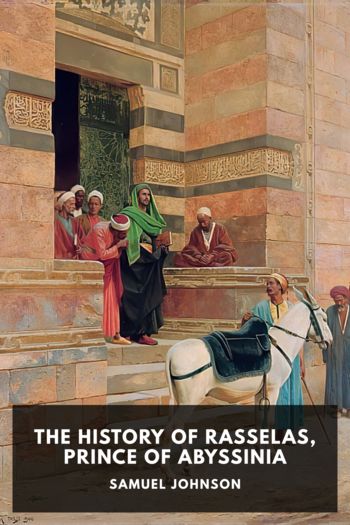The History of Rasselas, Prince of Abyssinia - Samuel Johnson (best novel books to read .TXT) 📗

- Author: Samuel Johnson
Book online «The History of Rasselas, Prince of Abyssinia - Samuel Johnson (best novel books to read .TXT) 📗». Author Samuel Johnson
“The old Egyptians have left behind them monuments of industry and power before which all European magnificence is confessed to fade away. The ruins of their architecture are the schools of modern builders; and from the wonders which time has spared we may conjecture, though uncertainly, what it has destroyed.”
“My curiosity,” said Rasselas, “does not very strongly lead me to survey piles of stone or mounds of earth. My business is with man. I came hither not to measure fragments of temples or trace choked aqueducts, but to look upon the various scenes of the present world.”
“The things that are now before us,” said the Princess, “require attention, and deserve it. What have I to do with the heroes or the monuments of ancient times—with times which can never return, and heroes whose form of life was different from all that the present condition of mankind requires or allows?”
“To know anything,” returned the poet, “we must know its effects; to see men, we must see their works, that we may learn what reason has dictated or passion has excited, and find what are the most powerful motives of action. To judge rightly of the present, we must oppose it to the past; for all judgment is comparative, and of the future nothing can be known. The truth is that no mind is much employed upon the present; recollection and anticipation fill up almost all our moments. Our passions are joy and grief, love and hatred, hope and fear. Of joy and grief, the past is the object, and the future of hope and fear; even love and hatred respect the past, for the cause must have been before the effect.
“The present state of things is the consequence of the former; and it is natural to inquire what were the sources of the good that we enjoy, or the evils that we suffer. If we act only for ourselves, to neglect the study of history is not prudent. If we are entrusted with the care of others, it is not just. Ignorance, when it is voluntary, is criminal; and he may properly be charged with evil who refused to learn how he might prevent it.
“There is no part of history so generally useful as that which relates to the progress of the human mind, the gradual improvement of reason, the successive advances of science, the vicissitudes of learning and ignorance (which are the light and darkness of thinking beings), the extinction and resuscitation of arts, and the revolutions of the intellectual world. If accounts of battles and invasions are peculiarly the business of princes, the useful or elegant arts are not to be neglected; those who have kingdoms to govern have understandings to cultivate.
“Example is always more efficacious than precept. A soldier is formed in war, and a painter must copy pictures. In this, contemplative life has the advantage. Great actions are seldom seen, but the labours of art are always at hand for those who desire to know what art has been able to perform.
“When the eye or the imagination is struck with any uncommon work, the next transition of an active mind is to the means by which it was performed. Here begins the true use of such contemplation. We enlarge our comprehension by new ideas, and perhaps recover some art lost to mankind, or learn what is less perfectly known in our own country. At least we compare our own with former times, and either rejoice at our improvements, or, what is the first motion towards good, discover our defects.”
“I am willing,” said the Prince, “to see all that can deserve my search.”
“And I,” said the Princess, “shall rejoice to learn something of the manners of antiquity.”
“The most pompous monument of Egyptian greatness, and one of the most bulky works of manual industry,” said Imlac, “are the Pyramids: fabrics raised before the time of history, and of which the earliest narratives afford us only uncertain traditions. Of these the greatest is still standing, very little injured by time.”
“Let us visit them tomorrow,” said Nekayah. “I have often heard of the Pyramids, and shall not rest till I have seen them, within and without, with my own eyes.”
XXXI They Visit the PyramidsThe resolution being thus taken, they set out the next day. They laid tents upon their camels, being resolved to stay among the Pyramids till their curiosity was fully satisfied. They travelled gently, turned aside to everything remarkable, stopped from time to time and conversed with the inhabitants, and observed the various appearances of towns ruined and inhabited, of wild and cultivated nature.
When they came to the Great Pyramid they were astonished at the extent of the base and the height of the top. Imlac explained to them the principles upon which the pyramidal form was chosen for a fabric intended to co-extend its duration with that of the world: he showed that its gradual diminution gave it such stability as defeated all the common attacks of the elements, and could scarcely be overthrown by earthquakes themselves, the least resistible of natural violence. A concussion that should shatter the pyramid would threaten the dissolution of the continent.
They measured all its dimensions, and pitched their tents at its foot. Next day they prepared to enter its interior apartments, and having hired the common guides, climbed up to the first passage; when the favourite of the Princess, looking into the cavity, stepped back and trembled. “Pekuah,” said the Princess, “of what art thou afraid?”
“Of the narrow entrance,” answered the lady, “and of the dreadful gloom. I dare not enter a place which must surely





Comments (0)